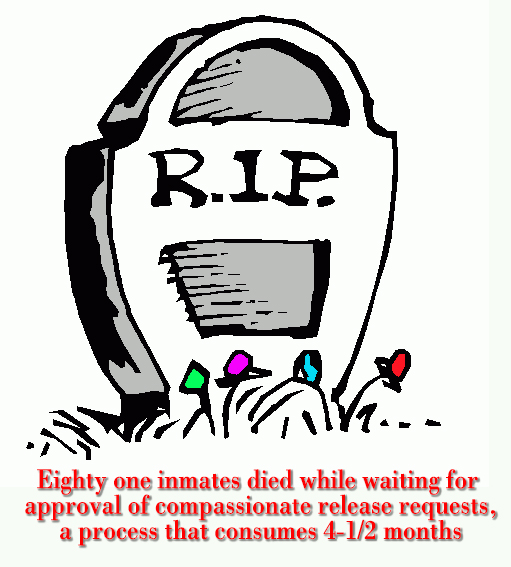We post news and comment on federal criminal justice issues, focused primarily on trial and post-conviction matters, legislative initiatives, and sentencing issues.
BOP ADMITS FEWER THAT 10% OF COMPASSIONATE RELEASE BIDS MAKE IT PAST THE DIRECTOR
Nearly six months after 16 Senators requested it, the Bureau of Prisons has finally come off compassionate release numbers for the last three years.
 Under 18 USC 3582(c)(1), a prisoner who has extraordinary reasons – usually medical, age-related or family-related – may receive a reduction in sentence (RIS). An inmate must first get a recommendation from the institution warden, and then approval of the BOP Director. If the Director forwards the motion to the sentencing court, the district judge will then decide the motion.
Under 18 USC 3582(c)(1), a prisoner who has extraordinary reasons – usually medical, age-related or family-related – may receive a reduction in sentence (RIS). An inmate must first get a recommendation from the institution warden, and then approval of the BOP Director. If the Director forwards the motion to the sentencing court, the district judge will then decide the motion.
From January 1, 2014, through the end of 2017, 3,182 inmates sought RIS relief. Only one out of four made it past the first level of review, the warden of the prison in which the inmate was held. At the Director’s office, only 306 requests, or 9.6% of the total originally filed, made the cut.
About 25% of RIS requests came from dying inmates. Another 35% came from seriously ill (but not terminal) inmates. Elderly inmates with medical conditions were another 15%, and elderly inmates who were otherwise healthy constituted 8%. Inmates who were sole caregiver for a child constituted 9% of the requests, and people needing to care for a spouse were 3.4% of the requests.
 The RIS requests with the most chance of approval came from terminally ill inmates. One half of all such requests made it to the Director. Another 16% of requests from seriously ill inmates were referred. One out of four requests from elderly prisoners with medical conditions made the cut, while one-third of healthy elderly prisoners’ requests were approved by wardens. Approvals for caregivers of spouses and kids came in at under 15%.
The RIS requests with the most chance of approval came from terminally ill inmates. One half of all such requests made it to the Director. Another 16% of requests from seriously ill inmates were referred. One out of four requests from elderly prisoners with medical conditions made the cut, while one-third of healthy elderly prisoners’ requests were approved by wardens. Approvals for caregivers of spouses and kids came in at under 15%.
It takes about 4-1/2 months to get the Director’s approval. The BOP did not break down which categories were approved in what numbers by the Director, but it admitted that 81 inmates died while waiting for approval of their RIS requests.
The BOP has been engaged in an inter-agency fight with the Sentencing Commission for control of the compassionate release process for more than a year. The Sentencing Commission believes that the BOP should only determine that inmates meet eligibility standards, and leave decisions about whether they are deserving of a lower sentence to judges.
The BOP told the Senators that RIS requests were usually denied because its criteria were not met, including
• the inmate did not meet the medical condition criteria;
• the inmate’s medical condition did not impact ability to function in prison;
• the inmate had not served enough time toward his sentence required by the elderly inmate criteria;
• the inmate could not show he or she was the sole family member capable of providing care to a child, spouse, or registered partner; or
• the inmate lacked stable residence and release plans.
 The sentencing advocacy group Families Against Mandatory Minimums was quick to blast the BOP letter. “We are disappointed but not surprised,” FAMM president Kevin Ring said. “Even as interest in prison reform grows, we find that the BOP is not using its authority to reduce the number of low-risk, high-cost individuals in federal prisons. This failure hurts families and taxpayers without improving public safety.”
The sentencing advocacy group Families Against Mandatory Minimums was quick to blast the BOP letter. “We are disappointed but not surprised,” FAMM president Kevin Ring said. “Even as interest in prison reform grows, we find that the BOP is not using its authority to reduce the number of low-risk, high-cost individuals in federal prisons. This failure hurts families and taxpayers without improving public safety.”
Sentencing Law and Policy, Lamenting latest data on how federal Bureau of Prisons administers its compassionate release program (Feb. 9, 2018)
FAMM, New Data Reveals BOP Still Neglecting Compassionate Release (Feb. 8, 2018)
Letter from BOP Office of Legislative Affairs to Sen. Brian Schatz (Jan. 16, 2018)
– Thomas L. Root

